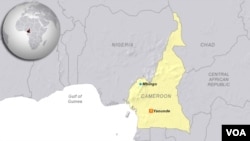Lawyers in Cameroon are complaining that justice is being hampered because of the language barrier, when French-speaking attorneys litigate court cases in the English-speaking part of the country and English-speaking lawyers argue cases in courts in the French-speaking part of the country. English and French are official languages in Cameroon; but, the English-speaking part of the country based on the common law system, which is not taught to French-speaking lawyers, and the French-speaking part of the country practices the civil law system, which English-speaking lawyers are not trained in.
Cameroon's legal system, like most in Africa, is rooted in its colonial past. The common law system inherited from English colonial masters is practiced in Cameroon's English-speaking northwest and southwest regions. The civil law system inherited from French colonial masters is practiced in the other eight regions, which are French speaking.
Educator George Tambe of Cameroon's Ministry of Higher Education says having two different legal systems in the country creates problems, particularly as lawyers who may only speak one of the official languages, or are trained in only one of the legal systems, are called upon to litigate in unfamiliar legal and linguistic terrain.
"At this level, let's get back to the law and see where the problems lie," said Tambe. "W orking in two different areas means we are disintegrating. The recipients are those who are going to have problems. They are going to suffer a lot. If we are moving towards national integration, we should not be having a law which is different from another law in the same country."
Lawyer Nico Hale, president of the general assembly of the Cameroon Bar Council, says English-speaking lawyers started pressing for reforms when French speaking lawyers were transferred to courts in the English-speaking part of the country.
"We are talking about the courts where the litigants are supposed to follow the submissions, what they are seeing, what they are saying, even written so that there should be fair trial at the end," said Hale. "If he is leaving the court, if he lost the case he knows the facts, if he won he knows why he won the case. So if he leaves without knowing what transpired in court, there can be no fair trial and when there is no fair trial you can't talk of justice."
Dr. Willibroad Dze-Ngwa, lecturer at the University of Yaounde One, says the discrepancies in executing justice is just one of several issues bringing problems to the English and French speaking sections of Cameroon.
"To think that the Francophones {French speaking Cameroonians} compel the lawyers to do submission in French, English is considered in Cameroon as a second thought, not as a first thought alongside the French language and I think that it is regrettable," said Dze-Ngwa. "We have had the lawyers complain, the teachers are protesting, the parliamentarians wrote a memorandum to the prime minister. It is unbearable."
Sociologist Victor Obi says when Cameroon harmonizes the two legal systems the citizens will be assured of fair trials and the English minority which constitutes 20 percent of the population will not feel marginalized.
"We look at the French law, we look at the English law and then we bring out the elements that are not good and eliminate them," said Obi. "Bring out the elements that will make us unique as a nation and that will even become a kind of law in the world, the combination of the French and the English law."
Lawyer Nico Hale says in the meantime, French should not be spoken by judges and magistrates in English-speaking areas, and English in French-speaking portions of Cameroon.




